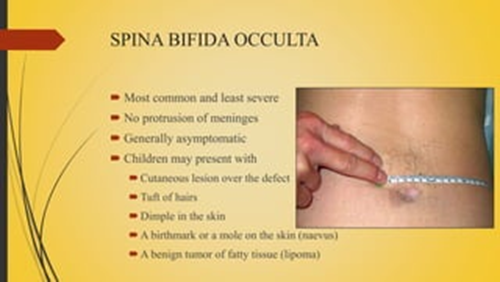A child with asthma has the following medication ordered: Theophylline 4 mg/kg/dose every 6 hrs. The child weighs 4.69 kg. Calculate the appropriate dose.
33.6 mg
18.7 mg
8.4 mg
19 mg
The Correct Answer is B
To calculate the appropriate dose of Theophylline for the child weighing 4.69 kg:
Dose = Weight (kg) × Dose (mg/kg)
Dose = 4.69 kg × 4 mg/kg
Dose = 18.76 mg
So, the appropriate dose is approximately 18.7 mg.
Nursing Test Bank
Naxlex Comprehensive Predictor Exams
Related Questions
Correct Answer is ["C","D"]
Explanation
A. Keep the infant in a side-lying position.
This intervention is not appropriate following cleft palate repair surgery. Placing the infant in a side-lying position may increase the risk of trauma to the surgical site and disrupt the healing process. It's important to follow the surgeon's recommendations regarding positioning, which typically involves keeping the infant in an upright position to minimize strain on the surgical site.
B. Remove elbow restraints while the infant is sleeping.
Elbow restraints are often used postoperatively to prevent the infant from accidentally touching or rubbing the surgical site, which could disrupt wound healing or cause discomfort. Removing the restraints while the infant is sleeping may increase the risk of unintended movement or injury to the surgical site. Therefore, it is not appropriate to remove the restraints while the infant is sleeping.
C. Administer pain medication around the clock for the first 72 hours.
This intervention is appropriate. Pain management is an essential component of postoperative care following cleft palate repair surgery. Administering pain medication around the clock helps to maintain consistent pain relief and prevent spikes in discomfort. Pain management should be tailored to the individual needs of the infant and may include both non-pharmacological measures and analgesic medications.
D. Feed the infant half-strength formula for the first 48 hours.
This intervention is appropriate. Following cleft palate repair surgery, feeding may need to be adjusted to accommodate the infant's comfort and ensure adequate nutrition while minimizing the risk of aspiration. Feeding the infant half-strength formula or other appropriate feeding methods as recommended by the healthcare provider can help prevent stress on the surgical site and reduce the risk of complications such as aspiration pneumonia.
Correct Answer is D
Explanation
A. Flaccid paralysis of lower extremities:
Flaccid paralysis refers to a weakness or loss of muscle tone in the affected muscles, leading to decreased or absent movement. This finding is not typically associated with spina bifida occulta. Instead, it is more commonly seen in more severe forms of spina bifida, such as myelomeningocele, where there is significant involvement of the spinal cord and nerves.
B. Hip dislocation:
Hip dislocation can occur in individuals with myelomeningocele due to muscle weakness, abnormal muscle tone, and joint deformities associated with spinal cord defects. However, it is not typically associated with spina bifida occulta, which usually presents with less severe spinal cord involvement.
C. Hydrocephalus:
Hydrocephalus, characterized by the accumulation of cerebrospinal fluid within the brain, is a common complication of myelomeningocele due to disturbances in the flow and absorption of cerebrospinal fluid caused by the spinal defect. It is less commonly associated with spina bifida occulta, which typically involves a less severe spinal cord defect.
D. Dimple in sacral area:
This is the correct choice. A dimple, patch of hair, or birthmark in the lower back or sacral area is a common finding in spina bifida occulta. It occurs due to the incomplete closure of the spinal column during fetal development, leading to a small defect in the vertebrae. This is often a subtle manifestation of spina bifida occulta and may not cause significant symptoms or functional impairment.

Whether you are a student looking to ace your exams or a practicing nurse seeking to enhance your expertise , our nursing education contents will empower you with the confidence and competence to make a difference in the lives of patients and become a respected leader in the healthcare field.
Visit Naxlex, invest in your future and unlock endless possibilities with our unparalleled nursing education contents today
Report Wrong Answer on the Current Question
Do you disagree with the answer? If yes, what is your expected answer? Explain.
Kindly be descriptive with the issue you are facing.
